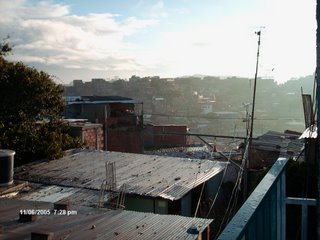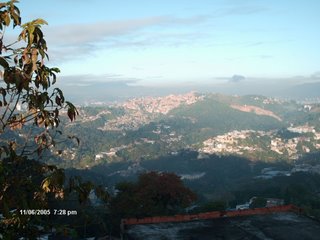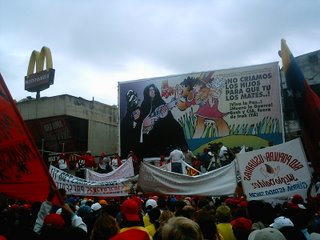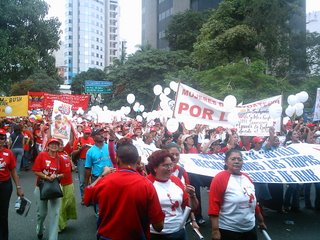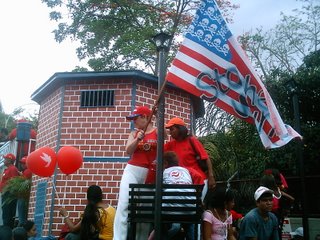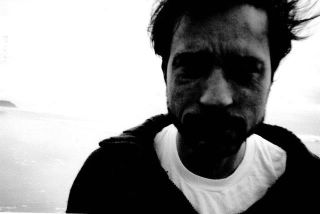La Vida Dolorita - Part 3: And Four Walls
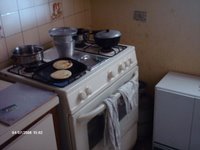 Inside the house, there´s a nice kitchen, a gas stove (the gas comes from tanks that last about a month) - which, in any case, is way better than cooking electric. They have a refrigerator, yes. Several cupboards, with food in them. To the left, you can see some arepas that I made.
Inside the house, there´s a nice kitchen, a gas stove (the gas comes from tanks that last about a month) - which, in any case, is way better than cooking electric. They have a refrigerator, yes. Several cupboards, with food in them. To the left, you can see some arepas that I made.There´s a TV set, where Lenis watches the Catholic Rosary Show in the morning, where regular people say lots and lots of Hail Marys, and sometimes, a floating image of the Virgin hangs suspended there on the screen for your meditative pleasure. Alexander watches sports at night. Also in the kitchen is usually a large jug of water, like the ones that are used in office coolers, but its not attached to a cooler. We buy that for 4000 bolivares down there at the bodega at the foot of the stairs.
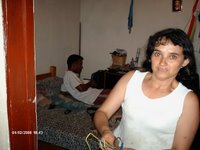 Directly across from the kitchen opening is the main bedroom of Lenis and Alexander, with a bigger TV that plays DVDs. Down a little hallway, and we reach the dining room. It contains a sizeable dining table, and now a large china cabinet. The cabinet used to be in the hallway, but Jotsebe, Lenis and Alexanders preteen child, keeps rearranging the furniture.. to her credit, it does look better now.. but she keep stuffing everything on the table into one or two drawers, and I can´t find this cable or that pen.
Directly across from the kitchen opening is the main bedroom of Lenis and Alexander, with a bigger TV that plays DVDs. Down a little hallway, and we reach the dining room. It contains a sizeable dining table, and now a large china cabinet. The cabinet used to be in the hallway, but Jotsebe, Lenis and Alexanders preteen child, keeps rearranging the furniture.. to her credit, it does look better now.. but she keep stuffing everything on the table into one or two drawers, and I can´t find this cable or that pen.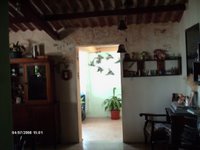 There´s also a computer, with a really green screen monitor, and this wind chime of bells that is definitely hanging too low (you can see them in the upper middle of the photo at left). I know that, because I keep bumping into it. When I first arrived, I bumped into it alot, which is so funny, everyone says so. She says her friends always tell her, "Quitas las campanas" get those freaking bells out of there, because I´m not the only one who bumps into them. She´s short, so she never does. She just laughs, and they stay there. For a while, I tried really hard to make sure I didn´t bump into them, cuz it kind of hurts... but invariably, I would forget, and Clang! But now, after almost two months, I hardly ever bump into them anymore, without even thinking about it. What´s weird is, if I´m out of sorts, or preoccupied I walk right into them. I don´t consciously know the difference, but some part of me must now stay vigilant for the bells even though I´m not aware of it. It seems very buddhist, really, for a Catholic household.
There´s also a computer, with a really green screen monitor, and this wind chime of bells that is definitely hanging too low (you can see them in the upper middle of the photo at left). I know that, because I keep bumping into it. When I first arrived, I bumped into it alot, which is so funny, everyone says so. She says her friends always tell her, "Quitas las campanas" get those freaking bells out of there, because I´m not the only one who bumps into them. She´s short, so she never does. She just laughs, and they stay there. For a while, I tried really hard to make sure I didn´t bump into them, cuz it kind of hurts... but invariably, I would forget, and Clang! But now, after almost two months, I hardly ever bump into them anymore, without even thinking about it. What´s weird is, if I´m out of sorts, or preoccupied I walk right into them. I don´t consciously know the difference, but some part of me must now stay vigilant for the bells even though I´m not aware of it. It seems very buddhist, really, for a Catholic household.Off the dining room is Jhorlan´s empty room - that´s Lenis and Alexander´s son. He doesn´t stay at the house, but the room is alwasy there in case he wants to. Reportedly, he stays with his girlfriend´s family, though I´m not sure of the details on this.
 One more big room, the living room, doesn´t get a lot of use, mostly when special visitors come. This is where the front door is, and there´s a little altar with a bible, a statuette of Mary, and a vase for roses. Sorry, the photo is sideways. Jotsebe, their daughter, sleeps in a room just off the sitting room. They say their house is humble, but they own it. I think it´s magnificent. I sleep upstairs where the radio is, but that´s another story.
One more big room, the living room, doesn´t get a lot of use, mostly when special visitors come. This is where the front door is, and there´s a little altar with a bible, a statuette of Mary, and a vase for roses. Sorry, the photo is sideways. Jotsebe, their daughter, sleeps in a room just off the sitting room. They say their house is humble, but they own it. I think it´s magnificent. I sleep upstairs where the radio is, but that´s another story.Lenis is a fervent Catholic. She is inspired by the saying of the rosary on the TV in the morning, and very often asks god to grant her favors, which generally speaking, occur. In one of the weirdest spiritual ironies this side of purgatory, she implied once that I was a gift from god. She told me that, the day I showed up, she was praying hard for a temporary and immediate solution to their money situation. I was, of course, hoping I could find a better, cheaper place to stay than the hotels I´d been in for the prior two months. I don´t pray the way she does, but I gots my own faith, and it seems to me that my People got together with her People and made a little Arrangement. And it came just in time for all of us. The rent money and the cash I´m paying them for helping me with the documentary isn´t a permanent solution to their problems, but their hospitality has almost completely solved mine.
